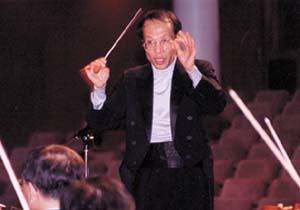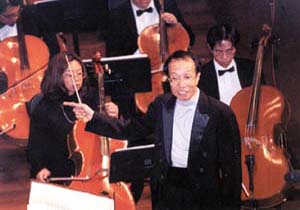

Conductors
One task, many roles
By Sally Yip
Respect. Elite. Reputed. These are the words that come to mind when talking about conductors
in orchestras.
However, being a conductor is not an easy job.
“It is difficult,” said Mr. Ambrose Law, music director and conductor of the Hong Kong Symphony Society. “Conductors have to possess profound musical knowledge and very rich experience.”
It is important that they at least know as much about the music as every other member of the orchestra.
“They may not need to know how to play every kind of musical instrument, but at least they should know the effects made by each,” he said.
It is especially not easy for new conductors to stand out among the older and more experienced ones.
Mr. Law said this is a factor that possibly discourages people from choosing the profession.
“Newly graduated conductors are young and inexperienced,” he said. “They may appear to be less reliable and capable, though this may not be true.”
Conductors not only lead the orchestra in concerts, but also play the role of group leaders.
“Therefore, qualities such as reliability and capability are very important besides having profound knowledge about music,” Mr. Law said.
An orchestra usually consists of 106 to 108 members, making teamwork and communication skills especially important.
“Conductors should get along well with the other members of the orchestra. Most desirably, they should become good friends,” continued Mr. Law.
“However, at the same time, the conductors have to be strict enough to make high demands on their orchestra members so as to improve.”
Miss Kathy Fok, a music director and principal conductor of the Hong Kong Children’s Choir, insisted that conducting is teamwork.
“For soloists, their success mainly depends on their own efforts.
“However, for conductors, their success has to depend on the overall cooperation and efforts of all the other members.
“Whether a performance is successful depends on the entire orchestra. It is not a matter only for one or two, but for the whole.”
Despite the rigors of conducting, there are few programs in Hong Kong that teach all of the skills required.
Miss Fok said there is a lack of academic opportunities for students interested in conducting.
Said she: “So far, there are no regular conducting courses in Hong Kong. Only a few seminars are occasionally held at music schools.
“Even in foreign countries, there are only one to three places in each conducting stream.”
Therefore, the field is highly competitive.
Miss Ho Ka Sin, a Year 1 student studying strings at the Hong Kong Academy for Performing Arts, holds the same view.Said she: “Very few of my classmates have ever thought of becoming conductors. The requirements are so high that it seems very difficult to become a conductor.
“We would rather learn instruments like piano, violin and string, which seem to be easier.”
In fact, her school does not offer any major conducting courses.
Mr. Anthony Camden, the dean of the music department at the Hong Kong Academy for Performing Arts, said that students should first wholeheartedly learn music before thinking about conducting.
“It is not so important to organize conducting courses,” he said. “I do not think that music students are ready to embark on conducting.
“They should first concentrate on their own major instruments and practice in orchestras.”
In fact, Mr. Law said that, to a certain extent, conducting cannot be taught.
He said, “Theories and history about music can be taught, but not the styles or the temperaments of conducting.“Nevertheless, these are actually the most important elements to be a good conductor.”
He added that conducting is a practical experience that requires a conductor to work with an orchestra, not a practice in a classroom.
“Unlike the others, conductors cannot do much preparation beforehand or practise at home independently,” said Mr. Law. “They need a real orchestra before them for practice.
“Otherwise, conducting will become totally meaningless. This is probably the problem of offering conducting lessons at schools.”
Therefore, he encourages students who are interested in conducting to enrich their knowledge by themselves.
“For example, watching videos or television programmes about conducting, attending orchestral performances and listening to classical music more — all of these are some very effective ways to absorb various essential conducting techniques.
“Besides, their level of music appreciation will also be raised.”
In fact, few people really understand the job of conducting, even though more and more people are becoming interested in conducting.
Miss Fok characterized the roles of conductors as those of educators, stage performers and magicians.
Said she: “They instruct the rest of the orchestra, pointing out their mistakes and teaching them how to play their instruments better.”
Unlike the other musicians, conductors do not use any instruments to perform, except the baton.
Miss Fok said, “They just stand in front of the stage, using their gestures and body language to lead the whole orchestra and expressing their feelings in the music.
“Sometimes, they are like magicians. A slight movement of their hands will lead to a great change in the whole expression of the music.”
Despite the toil, conductors usually earn a high salary.
Mr. Camden said that the payment for conducting a professional orchestra usually ranges from about $30,000 to $150,000.
However, students who study conducting can get other jobs as well.
Said Mr. Camden: “Some outstanding conducting students, especially those who can play piano well, can get jobs in opera houses, where they may become chorus masters.
“Therefore, they may have opportunities to lead a choir and sometimes they may conduct in a choral concert, too.”
Apart from getting a well-paid job, conductors usually enjoy high social status.
Miss Fok said, “Hong Kong conductors enjoy social status as high as that of the foreign conductors.
“They are the ones who make the final decisions on most major issues in an orchestra.
“Therefore, they are generally highly respected.”